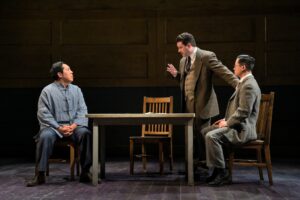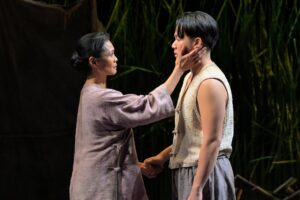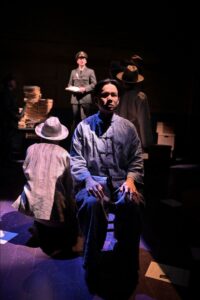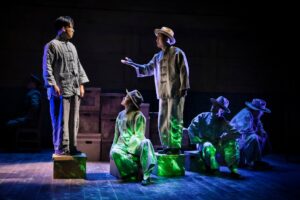The Far Country
Lloyd Suh
Berkeley Repertory Theatre
 “I do not want to take from America … I want to give to America.” So does the amiable, big-smiling Gee patiently make his case to the persistently doubtful U.S. Inspector to prove in 1909 that he is a naturalized American citizen who – like everyone living in Chinatown in 1906 – lost all his proof-of-birth papers in the earthquake and subsequent fire of San Francisco. Gee just wants permission to return to China to see his family and to bring his son back to the U.S., to a country that has all but excluded since 1882’s Chinese Exclusion Act any further Asian immigrants beyond those that were brought here in the 1860s to build the Transcontinental Railroad. The incredibly difficult yet inspiring story of Gee and the next two generations of a family who sacrifice their past identities and family connections to “live among people who consider me less than human” is the powerful focus of Lloyd Suh’s The Far Country, now in a stunning, unsettling production at Berkeley Repertory Theatre.
“I do not want to take from America … I want to give to America.” So does the amiable, big-smiling Gee patiently make his case to the persistently doubtful U.S. Inspector to prove in 1909 that he is a naturalized American citizen who – like everyone living in Chinatown in 1906 – lost all his proof-of-birth papers in the earthquake and subsequent fire of San Francisco. Gee just wants permission to return to China to see his family and to bring his son back to the U.S., to a country that has all but excluded since 1882’s Chinese Exclusion Act any further Asian immigrants beyond those that were brought here in the 1860s to build the Transcontinental Railroad. The incredibly difficult yet inspiring story of Gee and the next two generations of a family who sacrifice their past identities and family connections to “live among people who consider me less than human” is the powerful focus of Lloyd Suh’s The Far Country, now in a stunning, unsettling production at Berkeley Repertory Theatre.
In fact as he proudly turns to salute the Inspector’s American flag, Gee is doing his best not to be accused of being the “paper son” that he is, a Chinese immigrant who entered the U.S. with purchased papers to falsely identify himself as a child of those early Chinese immigrants. His goal is now to find himself in China such a “paper son” to come help him run his newly formed laundry in Chinatown – the only route that will be open for any Chinese to immigrate legally into the U.S. until the Exclusion Act’s repeal in 1943.
When he does arrive in 1910 in Taishan, China, Feodor Chin’s Gee is no longer the easy-going, “funny guy” he played in order to get on the good side of the immigration authorities. He is now a determined salesman with a business proposition at the small, sugarcane farm of near-starving and poor, single mother, Low (a firm-jawed, steady eyed, and immensely proud even if dirt poor Tess Lina).

For $100 per year of age, Gee will create a back story that her sixteen-year-old son, Moon Gyet, must learn in order to convince the immigration officers in the U.S. that he is the son Gee came back to get. That Moon will need to repay the balance of Gee’s required $1600 fee (minus a $160 deposit Low must borrow at exorbitant interest rates) as he earns $1/day in Gee’s laundry is to the over-hearing Moon a small price to pay.
To his mother Low, Moon admits, “I know I will never be the person I was before;” while to Gee he vows, “I know you are [now] my father.”
What Moon cannot predict is the hell he will endure for the next seventeen-plus months. Through the all-encompassing, stomach-churning sound design of Fan Zhang and the incredibly beautiful yet often other-worldly lighting created by Minjoo Kim, we as audience experience Moon’s excruciatingly dehumanizing journey across the Pacific, one where he and other hopeful immigrants are crammed like animals in the ship’s hold. There, each frantically memorizes the detailed histories of a childhood he never had in order to become the supposed son of a fake father he barely has met, all the time afraid to talk to any fellow travelers in fear their stories will later mix together.

But that journey is nothing compared to the months he will next spend at the Immigration Detention Center on Angel Island. Crammed into a living space meant for forty but often with a hundred-plus, Moon is only able to be outside one hour per day except for his repeated sessions of questioning by the pacing, eye-piercing Inspector (John Keabler) who bores into the defiant, confident, and ever-cooperating Moon as if interrogating a spy or an accused murderer. Questions about family history, childhood neighbors, and minute descriptions of school and home degenerate into demands of how many steps led into his home, made of what material, and what specific shade of color. The goal: Find one inconsistency from any past interview in the months prior. One mistake, it is back to China.

Tommy Bo is nothing short of electrifying as the young, determined Moon. In him, we see Every Immigrant who alone faced such hate-and-prejudice-based interrogations that 175,000 Chinese underwent between 1910 and 1940. Director Jennifer Chang and Movement Designer Erika Chong Shuch combine their ingenuity to surround Moon with fellow immigrants moving in, out, and about him, chanting their stories and often confessing “This is how they got me” before their deportations. Their stories become poems painted and engraved on the walls of their Angel Island jail, present images of which we get a glimpse as one part of Hsuan-Kuang Hsieh’s outstanding projection designs.
As Moon himself becomes ever-more worn down by the process designed to break him, boxes of filed notes from never-ending cross-examinations about stairs and colors become a maze of moving steps and ledges Moon is forced to cross, all the time reams of paper fall like snow all around (all part of Wilson Chin’s stark and telling scenic design). As rejection after rejection of Moon’s request for immigration is followed by more and more appeals and more and more months of jailed confinement, we as audience cannot help but wonder, “And why am I just now learning tonight of all this important history for the first time in my life?”

As the years pass in the second act, the return to the homeland of the few, successful “paper sons” continues to bring another generation of now sometimes “paper wives” to a U.S. that continues to block legal entry of Chinese. One such offer is made to Yuen, a poor farmgirl with a near-unbounded spirit and spunk of optimism and hope for a better life. Sharon Shao commands the stage as a girl not yet woman who brings surprisingly mature and determined but also coy and attracting mannerisms to Yuen’s persona. Her Yuen soon finds herself transforming with a knowing smile and a big heart a business proposition involving the $1600 fee into a marriage proposal and a promise of a new generation of children actually born in the U.S. (and not just on paper).
The breath-catching, near-excruciating events we witness in the first act along with especially Sharon Shao’s introduction of Yuen in the beginning of the second are almost too over-whelming for the final parts of Act Two, where the pace slows a bit and where the expressed hopes and dreams of the future – while important to be heard – seem to go on and on too long.
The lives of Gee, Moon, and Yuen become of course interlaced as a “paper family” becomes a genuine, American family full of love and devotion. Their story is so enthralling and educating to watch unfold, even as it is also devastating and depressing to witness first-hand and to experience emotionally this disastrous part of a little-known part of U.S. history. What is more disturbing are the parallels so obvious to current stories and treatment of those wanting to immigrate to the U.S., making Berkeley Repertory Theatre’s staging of Lloyd Suh’s The Far Country not just an important recounting of the past, but a compelling commentary about the present.
Rating: 4 E
The Far Country continues in a two-hour (including intermission) production by Berkeley Repertory Theatre through April 14, 2024, at Peet’s Theatre, 2025 Addison, Berkeley, CA. Tickets are available online at https://www.berkeleyrep.org or by calling the box office Tuesday – Sunday, noon – 7 p.m. at 510-647-2949.
Photo Credits: Kevin Bernes

Leave a Reply